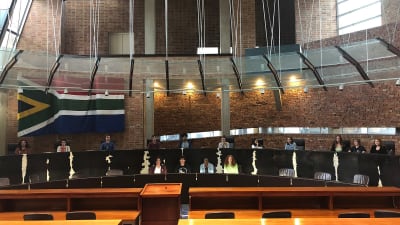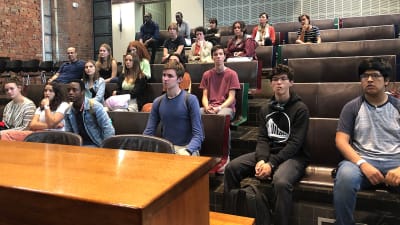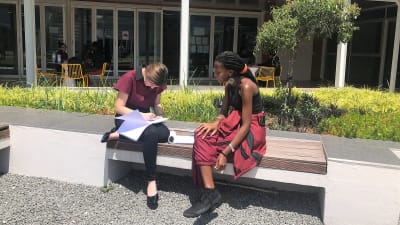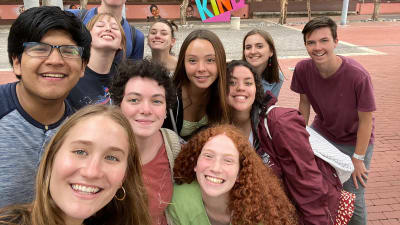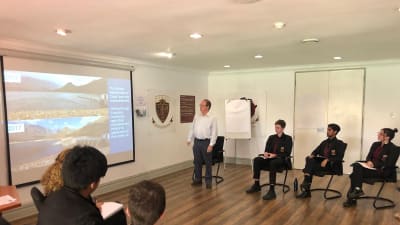Segl at Ala: Rhythms, Routines, and Reporting
Now more than a month in, SEGL at ALA students have established routines and settled into a rhythm, building a home here and finding familiarity within the new experiences they are having both on and off campus.
For Isadora G-L. from Massachusetts, her routine begins when her roommate Cecile M., who hails from DRC and South Africa, wakes up around 4:30am. An hour or two later, she’ll get out of bed herself to head to breakfast before classes begin. One of her favorites is Politics of Natural Resources, an African Studies course taught by Mr. Olajide Alder, a Nigerian economist who loves to engage Isadora in vibrant debates about the relationship between his country and hers in front of the rest of the class. In the late afternoon, she might go to soccer practice or ALApella choir rehearsal: SEGL at ALA students can try out for ALA’s sports teams, audition for musical groups, and join/start clubs on campus. After dinner, it’s “prep” (study hall) from 7-9, where Isadora says she is likely to spend at least half of her time journaling before finishing up homework on her hall that night.
In addition to the personalized routines our students are developing, they all have a common experience in our flagship Ethics and Leadership class. The last few weeks of E&L have included a deep dive into media literacy, a topic SEGL has added as a case study in the last few years with the rise of the “fake news” era. At SEGL at ALA, we are also considering how the western media portrays the African continent, examining stories and language with a critical lens in both E&L class and English.
We began this extended case study with an exercise designed to help students understand the challenge of modern news production and consumption: after asking each student to write down the news sources she or he used most, we asked all students to arrange those sources on a matrix. On the “x axis” of that matrix was the liberal-conservative spectrum; on the y-axis, how reliable each source was. The results were fascinating and showed both assumptions and blind spots in our group’s favorite news sources; it also helped create many questions for our guest experts.
Our first guest expert for this unit was Ryan Lenora Brown, The Christian Science Monitor‘s Africa correspondent, who is based in Johannesburg. She has reported from nearly two dozen countries on the continent, and in addition to The Monitor has been published in The Washington Post, The New York Times Magazine, Runners World, Newsweek, The Atlantic CityLab, ForeignPolicy.com, The Daily Beast, The Chronicle of Higher Education, Al Jazeera, U.S. News and World Report, and The Guardian, among others. Her session was a fascinating, candid dive into the considerations for an American reporter telling stories of Africa: What happens when, in telling authentic stories, you are also confirming a stereotype? How do you make journalistic decisions that preserve authenticity but don’t confirm western biases? She also acknowledged her role as a conduit for a non-African audience for African news stories and shared some of her own philosophies on how to empower local journalists rather than being the one to tell stories for them.
How appropriate, then, that our next guest speaker was local journalist Pontsho Pilane, the acting news editor at Health-e News, one of South Africa’s oldest health news services. Before joining Health-e, she was a health reporter at Bhekisisa centre for health journalism, and prior to that, she was a news reporter at the Mail & Guardian. She debuted as a journalist at The Daily Vox, where she primarily wrote about the intersection of gender and race. She was one of the leading journalists covering the #FeesMustFall student protests in 2015. Pontsho is also a regular commentator on South African radio and television, and sometimes international media, on issues such as gender, race and health. Students were particularly interested in hearing about her role as a student reporter during #FeesMustFall and her ideas of how to change the South African education system to be more inclusive for all, specifically the high fee structure of private tertiary education. Her reporting during #FeesMustFall put the priority on student voices rather than, for example, the chancellor of the University, and she emphasized the importance of underrepresented perspectives in her journalism.
In English class, too, we have been discussing how to tell stories of people and places that are not you and your home. In addition to dissecting texts that represent western portrayals of Africa and African portrayals of the west, we created our own story exchange project, modeled after Narrative 4‘s work on empathy development. Students were paired up randomly and picked a story from their lives to share with their partner. The partner took notes, asked follow-up questions, and produced a first-person narrative of the story to deliver to the class as if it were their own story. The topics ranged from deeply personal to hilariously funny, and the entire English class–made up of half SEGL students and half ALA students–felt newly connected after this experience. With their permission, we are sharing one pair’s stories here: Claire tells Idai’s story and Idai tells Claire’s story.
The following Thursday, we put our students’ critical thinking and budding journalism skills to the test in an afternoon-long journalism simulation. In small groups, the students traversed ALA’s campus, imagining it was a Central Asian autocracy with a breakaway rebel province. Our faculty and ALA’s played various key leaders in what turned out to be a dramatic series of events. The catch? Through shrewd observation, questioning, and research, our students had to figure out which (if any) of the leaders to believe. What was really going on? The activity culminated in three-minute on-the-scene video presentations in which each group decided what to share, and how. (What was the truth? You’ll have to ask a student!)
Last week, we explored climate change on the continent as our case study. We began with an introductory lecture from Mr. Hans Sowder, ALA’s Science Department Head. His session invoked skills from our media literacy case study, asking students to transfer them to science data literacy as they engaged critically with global arguments that affirm and deny climate change. Students then participated in a “design thinking” activity to ideate potential solutions for the world’s five countries most vulnerable to climate change. And finally, they had the opportunity to consider the real-life ethical dilemmas involved in leadership around climate change when we hosted Cape Town’s Deputy Mayor Ian Neilson, who was Acting Mayor during the height of the Cape Town water crisis from mid-2017 to mid-2018. He spoke with the students about the difficulties of coordinating both local and national governments, sharing that in a crisis, the decision-making process is often entirely different than when you are planning theoretically: for example, the asks the local government was making of the citizens of Cape Town were different than what they would have been able to justify during a non-crisis time. One particularly memorable moment was when he declared that he would be willing to lose an election over a politically difficult decision; much to think about for these emerging global leaders!
In the meantime, students have been venturing off-campus on outings planned by SEGL and ALA alike. Last weekend, we did the terrific Red Bus Tour of Johannesburg, which allowed students to get a better sense of the many, varied neighborhoods of this sprawling city, from the bustling central business district to the leafy green suburbs. The tour concluded at Constitution Hill, where we got off and took a tour of the former prison complex that is now home to South Africa’s Constitutional Court. (The cover photo of this post features the students in the justices’ seats!) In other excursions, students have had the opportunity to see the Oscar-nominated short films at The Bioscope, an independent cinema in downtown Joburg (with repurposed car seats for chairs!); ride roller coasters at Gold Reef City Theme Park; see plays and opera at local theatres; and other activities. We’re planning a hike in the Walter Sisulu National Botanical Gardens next weekend and gearing up for a fun-filled March break. We can’t believe it’s just around the corner!

